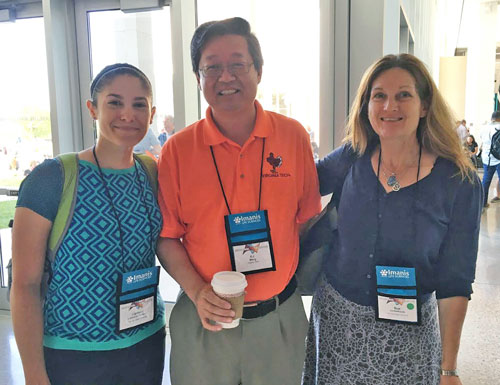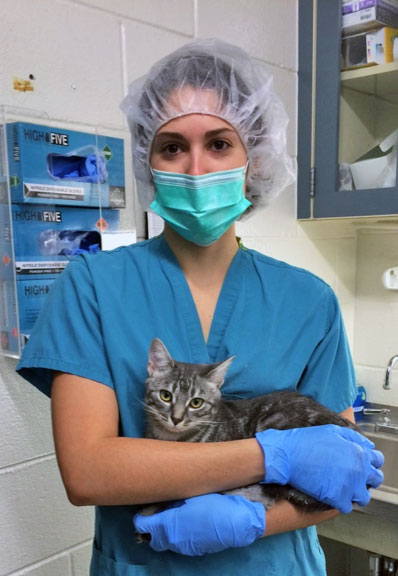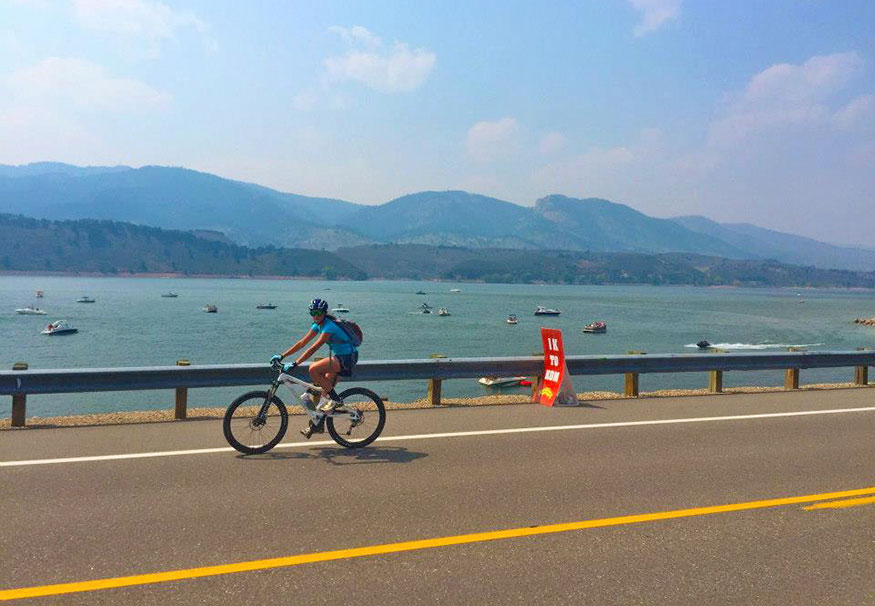Carmen Ledesma-Feliciano (DVM '12) returns to alma mater for virology meeting
July 1, 2016

Originally from San Juan, Puerto Rico, Carmen Ledesma-Feliciano began her undergraduate career at the University of Puerto Rico before transferring to the University of Maryland at College Park, where she earned her bachelor’s degree in pre-professional animal sciences in 2006. After graduating, Ledesma-Feliciano worked with research animal care company Priority One Services at the National Institutes of Health (NIH) in Bethesda, Maryland before applying to the veterinary college. While at the college as a public/corporate tracker, she completed fourth-year rotations with the Department of Homeland Security, where she ran qualitative risk assessments for wildlife trade, and Johns Hopkins University, where she did both lab animal and pathology rotations. She also worked with both the Virginia Tech Fish and Wildlife Conservation Department and the USDA. After graduating with her DVM in 2012, Ledesma-Feliciano began a combined lab animal residency and Ph.D. program at Colorado State University in Fort Collins, Colorado, where she works in alumna Sue VandeWoude's (DVM ’86) Feline Retrovirus Laboratory.
Ledesma-Feliciano was recently at Virginia Tech for the 2016 annual meeting of the American Society for Virology, which attracted over 1,200 scientists to the Blacksburg campus from June 18-22.
You’re here for the American Society for Virology (ASV) meeting? Yes, they hold their annual meeting in different places. They had it at Colorado State a couple years ago, and so they’re doing it this year here, and I was presenting a talk on Feline Foamy Virus, which is what I’m doing my Ph.D. work on now… It’s called that because the cells in vitro look foamy when they are infected. It’s a common contaminant of cell cultures actually, so a lot of people hate it. But it’s my virus, so I like it. I started doing my work with [Sue VandeWoude] halfway through my residency, and now that I’ve finished my residency last year, I’m a full Ph.D. student in her lab. I just finished prelims… so now I’m just strictly doing research and writing grants.
How did your talk at the conference go? It was on my virus — Foamy Virus — and where my research has focused so far… how the virus interacts with the host, domestic cats specifically. The virus has potential applications for vaccine development and gene therapy, and it’s already being used in that way actually, quite successfully.
You had a summer research experience here when you were at the vet school? I did [Summer Veterinary Student Research Program, or SVSRP] in 2009, and for that I interviewed with a couple of potential mentors, and Dr. Meng was one of them. Actually Dr. Eng, who wrote me a letter of recommendation, was like, “I’m not going to write you a letter of recommendation until you talk, actually talk to all of your potential mentors, because people often pick a lab and then they end up hating it.” So he was like, “Just go out there and talk to these people and see who you like.” And I’m really glad he told me to do that, because when I went out, and I talked to a couple people, I met Dr. Meng, and he and I got along really well. He was excited that I had interest in a Ph.D., and I ended up in his lab in the summer and I worked with porcine circovirus, which has agricultural significance. I… developed two viral chimeras for them that they ended up using in other studies. … During that summer I did a lot of bench work, and had a great time in the program, and it was another thing that cemented my interested in research… Dr. Meng is awesome, and I was paired with a co-PI (principal investigator) under him — Dr. Nathan Beach — who taught me a lot. So that was a really good experience for me which influenced where I am now.
What was it like being reunited with him at the ASV conference? That was awesome. He and I have stayed in contact since then, since 2009. He’s actually written several letters of recommendation for me, I think even the one that got me into the lab animal residency at Colorado State… He’s written letters for my grants that have been funded… I send him an email occasionally, and when I hear he receives awards sometimes, I shoot him an email. So we’ve kind of stayed in contact a little bit… He’s definitely been mentoring me in some degree over the years. He and Sue also maintain contact, and Sue and I were coming together to be in the conference, so the stars aligned… We bumped into [Meng] because he was running around organizing this whole event, so he was really busy. But we were all able to meet that day… He had organized … a dinner for previous and current members of his labs. So I reunited with some of my previous lab mates in his lab at that point, which was great.
Do you have any hobbies or interests outside of veterinary medicine and research? I did cycling while I was here, with Kristen Scheller, who was one of my classmates. We did a… bike across country for this group, Bike the US for MS… It was started by Don Fraser, who is a Blacksburg native, because his mom has MS and he wanted to do something for her, to raise awareness, and he was really into cycling, so he started this group… When we did it, it was in 2010… It was the summer right after our second year. And I figured this was probably to be my last free year, for forever, because right after that you go from third year straight into fourth year. And I was like, “I’m going to do something crazy!” So I did this ride. And so it started in Yorktown, Virginia, and ended in San Francisco… It took the whole summer, and it was 23 of us, I think… We all had to fundraise for it, and I think I raised $3,500 to be able to do it. And so out of the money that we all fundraised, some of it went to the ride, and a lot of it went to an MS clinic in Charlottesville. That year we raised over a $100,000, which is really cool. So I did some cycling here, and then I went out to Colorado… Colorado is super sporty and outdoorsy, and since I got out there I started racing bikes, and then I got into triathlons a lot. So I’ve been doing a lot of triathlon[s], and I actually started a racing team out there in Fort Collins. It’s 9Seventy Racing, for the area code — 970. It’s a multi-sport team, so we have people who just run [and] we have tri-athletes.
Do you have any pets? I do. I have… a long-haired Dachshund, and he’s thirteen years old. His name is Imu… I got him when I was in undergrad… He lived with my mom while I was in vet school, but now that I’m in Colorado, I got him back, so he’s with me. But I’ve had all sorts of animals growing up — I had dogs, cats, birds, fish, snakes…
Anything else you would like to add? The conference went great. I was worried about my talk because… when I come up with foamy viruses, people are like, “What is that?” And people are always really excited and ask lots of questions. I actually came out with a potential collaboration to do some future co-infection studies to look at the effects of my virus FFV, on FIV [Feline Immunodeficiency Virus], FeLV, and chronic kidney disease. So we’re going to potentially have a local shelter help us with sending us samples to do assays, so that’s pretty exciting.




